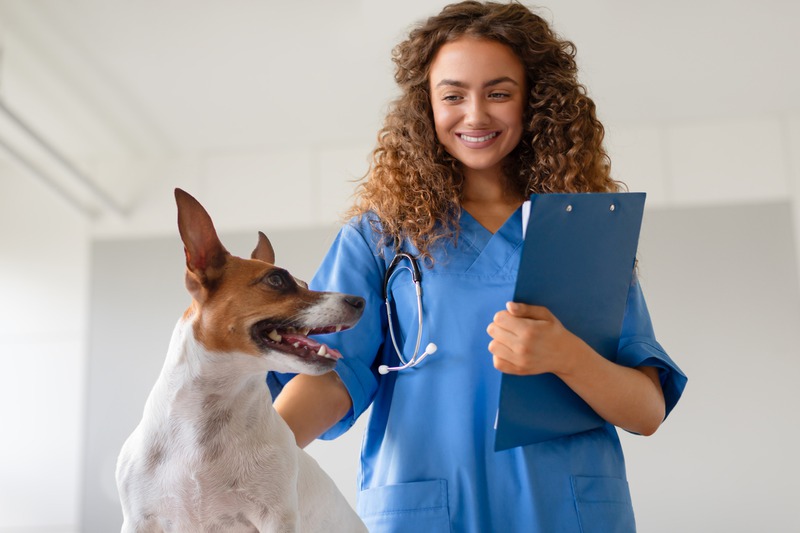If you have a pet, you love them just like any other member of your family. When they’re upset or sick, it feels as bad as if your kid is ill. It’s important to know when to get help from a special kind of vet called an internist, who knows a lot about serious sicknesses that can happen inside your pet’s body. You need to understand when your pet really needs to see the vet right away. We’ll explain these situations in an easy-to-understand way so you’re ready to take quick action if your pet ever gets really sick.
Recognizing Serious Symptoms in Your Pet
Spotting the early signs that your furry friend is unwell can be vital in managing their health. Here’s what to watch out for:
Rapid or Labored Breathing
Difficulty breathing can signal anything from asthma to heart failure, and it’s one symptom you should never ignore. If you notice your pet is panting excessively without having exercised or if their breathing seems strained, it’s time to contact your vet.
Uncontrolled Bleeding
Bleeding that doesn’t stop within a few minutes needs professional attention. This could stem from trauma, a ruptured mass, or a clotting disorder, and it’s essential to get immediate help.
Vomiting or Diarrhea
While an occasional upset stomach isn’t unusual, persistent or severe gastrointestinal symptoms – especially those accompanied by blood – need a vet’s intervention. Dehydration and electrolyte imbalances can quickly become life-threatening.
Unusual Lethargy or Collapse
Is your pet less responsive or unwilling to get up? Sudden weakness or fainting could point towards severe conditions such as heart disease, poisoning, or internal bleeding.
Loss of Appetite or Excessive Thirst
Not eating for more than a day or an insatiable thirst can indicate underlying issues like diabetes or kidney disease. Don’t wait too long to seek advice from a vet.
Seizures
A neurological emergency, seizures can be singular or repetitive. They suggest an urgent need for a neurological evaluation.
Painful Abdomen
When your pet is tender or defensive about their belly, it could be a sign of a severe ailment, such as pancreatitis or an obstruction that may require surgery.
Conditions That Warrant An Emergency Vet Visit
Now, let’s look into the specific conditions requiring an internal medicine specialist. Like detective work, veterinarians need knowledge to diagnose and treat these ailments accurately.
Toxin Ingestion
Accidental ingestion of toxins is a common mishap for curious pets. From chocolate to rodenticides, many substances can harm your pet. If you suspect your pet has swallowed something toxic, contact a vet immediately. They’ll advise on whether to induce vomiting or come in right away for emergency treatment.
Urinary Obstruction
Especially in male cats, a blocked urinary tract is a life-threatening predicament. If your cat is straining to urinate or not producing urine, this is an emergency that necessitates immediate veterinary care.
Foreign Body Ingestion
Dogs, in particular, are notorious for eating things they shouldn’t. If you know or suspect your pet has ingested a foreign object, they might need surgery to remove it before it causes an obstruction or perforation within the digestive tract.
Bloat or Gastric Dilatation-Volvulus (GDV)
Large breed dogs with deep chests, like Great Danes or Saint Bernards, are at risk for GDV, where the stomach fills with gas and twists on itself. This cuts blood circulation and calls for immediate surgery to prevent death.
Acute Kidney Failure
Kidney failure can strike suddenly due to toxins, infections, or other causes. Symptoms include vomiting, lethargy, and a decrease in urine output. This requires urgent care to prevent irreversible damage to the kidneys.
Severe Anemia or Internal Bleeding
Anemia, a low red blood cell count, can be due to internal bleeding, parasites, or bone marrow issues. Any of these conditions require a rush visit to the vet if your pet is pale, weak, or has a rapid heartbeat.
What You Can Do in an Emergency
Staying calm is essential, as is acting swiftly. Have your vet’s phone number and an emergency vet clinic’s contact information handy. Don’t try to treat your pet with over-the-counter medications unless prescribed by a vet – many human drugs are poisonous to animals.
-
Keep your pet warm and quiet.
-
Do not feed them, as it might complicate potential surgical procedures.
-
Transport your pet in a carrier or with a makeshift stretcher if they can’t walk.
Specialized Diagnostic Tools and Treatment
An internal medicine specialist has an array of diagnostic tools at their disposal. One such tool is an ultrasound for cats in Rancho Cucamonga, CA, which provides a non-invasive way to look inside the body. Vets use it to diagnose conditions involving the heart, kidneys, or liver without surgery.
They might also employ other diagnostics like endoscopy, advanced blood tests, or imaging such as X-rays and MRI to get to the root of your pet’s discomfort.
Internal Vet for Emergency Cases
When an emergency strikes, time is of the essence. Look for veterinary practices that offer a comprehensive range of services, and feel free to check their emergency vet services beforehand so you’re familiar with the process in case of an emergency.
It’s also wise to ask about their capabilities in managing complex cases – some conditions may require the expertise of a board-certified internal medicine specialist. These professionals undergo extensive training to provide the best care for pets with severe or chronic illnesses.
Final Thoughts
As pet owners, we must recognize signs of severe sickness in our animals and know when to seek a specialist. Early action is vital. Watch for changes in your pet’s behavior and health, and if unsure, consult a vet promptly to save their life potentially. Use this guide for reference and familiarize yourself with your vet’s emergency processes. Together in pet care, being ready shows our love for our pets.

